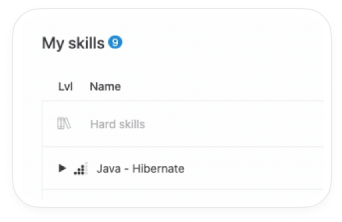What marketing skills make a marketer well-prepared for the new era? To answer this question, let’s review and assess marketing skills.
Deloitte reports that a whopping 90% of the world’s data has appeared over the past two years. This data is consumed on more than 26 billion smart devices worldwide. New trends in media consumption, combined with emerging marketing and data technologies, have necessitated the role of the agile marketer who is simultaneously strategic, creative, and analytical.
What does the research say about future marketing skills?
Leading executives report that knowledge of content marketing, strategy, and data analytics will be in demand. The world of business is changing, entailing changes in marketing.
Although a well-adapted marketing strategy has never been this essential, the methods by which organizations connect with their audience are changing. With the introduction of new approaches, the spread of social media, and various new channels to reach customers, business owners should hire marketing teams with top future skills.
According to the latest Drift research, knowledge of content strategy and data analytics will remain critical marketing skills in the future. The report is based on a survey of more than 100 marketing leaders in 25 industries.:
- 53% of respondents think that content marketing skills will be indispensable in the future
- 45% say strategy and brand management skills
- 41% say data and analytics skills
- 40% say marketing and customer understanding skills
- 31% consider marketing automation skills as essential.
Below are examples of soft and hard marketing skills that will remain relevant for the next five years.
Source: Smart Insights
Which marketing skills of the future to pay attention to when hiring?
Artificial intelligence and data analytics remain the key technology drivers that pave the way in neuromarketing and digital marketing.
Find out what trends impact the future of HR
Together with Insight222, we analyzed a large amount of macroeconomic data to reveal insights into the future of HR, key trends, and how they affect HR.
Soft skills
A recent Manpower Group survey shows that finding talent with the right skills is challenging. Employers say that communication, problem-solving, organization, and emotional intelligence are the most difficult skills to find in candidates. Thus, pay close attention to these future marketing soft skills.
Communication skills
In essence, marketing is staying in touch with the audience. Therefore, it’s not surprising that communication is the highest skill specialists in this field should have. It will remain relevant for the next five years. The ability to express and communicate concepts to others in an understandable, engaging way remains essential HR managers should pay attention to when searching for candidates.
Originality and problem-solving
The world is changing quickly, and what was relevant yesterday will be irrelevant tomorrow. Therefore, originality and unconventional thinking to find new ways to act are some traits of a successful marketer.
In addition, there is another vital marketing skill that requires finding innovative solutions to growing problems. 64% of hiring companies claim problem-solving is the top soft skill they seek when hiring marketing candidates. HR managers need to understand whether marketers have everything they need to create the most effective strategies using the resources available. Those who know how to take part in their initiatives and implement new initiatives will have the most significant demand for their talent resources available. Those who know how to take part in their initiatives and implement new initiatives will have the most significant demand for their talent.
Customer-centric approach
Who wants to give up an excellent and friendly service? Customer-focused marketing will only become more visible in the future. Over 80% of executives say that providing a high-quality customer experience is vital for the overall success of their business. The growth of social and digital media provides customers with more opportunities than ever before, so your marketing team needs to understand what drives your customers to work and campaign accordingly.
Technically literate, energetic, and, as a rule, savvy on social networks, all these marketing skills will give you an advantage when communicating with your customers.
Creativity
Bots can provide invaluable information and predict our audience’s behavior based on data. However, people with their creativity still win by creating the right marketing campaign for the business audience. Dr. Glenn Geer from Psychology Today says that highly-creative people are valued higher because creativity has a social dimension.
Creativity in marketing isn’t just about texts, images, and videos. Creativity is a marketing skill focused on the experience that encourages consumers to look at your brand and makes them feel valued and involved. Thus, creative skills in marketing are essential.
Emotional intelligence
Emotional intelligence is a person’s natural ability to recognize, understand, manage emotions, and influence them. This is one of the most intangible but essential marketing skills an employee can possess. Emotional intelligence allows the marketer to empathize with customers and communicate with them, facilitating more effective messaging.
Hard skills
As with almost everything in life, mastering any skill requires practice and the necessary knowledge to practice effectively. Thus, hard skills refer to specific and teachable abilities, such as working with technologies, statistics, and other analytical tools. Here are some marketing skills relevant in the future.
Omnichannel strategy
Omnichannel marketing skills are vital because they help create a positive experience for customers, reduce the outflow, and build a positive reputation for your brand. For example, Starbucks launched an app to pre-order coffee, so people could go to the store, pick up an order and leave. It simplified ordering, customer payment, and increased revenue through multichannel technology to get an order and leave. It simplified ordering, customer payment, and increased revenue through multichannel technology.
Content marketing
Social media, blogs, and videos should convert all the content. You should pay attention to the ability of the specialist to create posts on social networks that will engage your audience, be understandable in publications, and provide maximum results.
Some of your audience will read a blog; others will watch a video such as interacting with you or a brand you portray in real-time. Content marketing, if done right, can bring you closer to your target audience. A marketer who understands social networking algorithms will be in demand for work in the coming years.
Know Conversion Rate Optimization (CRO)
It’s useless if the prospects aren’t convertible. Ultimately, CRO helps brands understand visitor behavior, make observations, build a testing pipeline, execute the tests for statistical results, and engage through new-age channels. A specialist who understands the CRO principles is a key team player.
So, look for a marketer who understands the metrics of interaction, the sequence of transitions, A/B testing, and more.
Technological proficiency
55% of B2B companies use marketing automation as their strategy. Automation skills are just one of the many tools marketers use. Other examples include web analytics, social media management tools, and e-marketing platforms. Regardless of their role, all marketers will use one or more technologies daily for years to come.
Here’s the tool to analyze and build future skills
Upskill your employees through individual learning journeys to forward their career paths and improve your business.
Marketing technologies and general demands for the future
The futurist Dr. James Canton believes the AI economy’s takeover is coming quickly. We can control and shape it to our benefit and improve our world. He believes that deep learning will transition into deep thinking in the future, which will be a new type of cognitive machine intelligence.
The DMA Business Skills Census asked marketers to identify the skills and challenges their organizations face today and their importance in the future. These include email marketing, search marketing, and mobile marketing.
Basic requirements include:
- 2+ years of work experience
- Minimum degree in the relevant field
- Knowledge of automation and other work-related tools and software
- Understanding of marketing methods, trends, channels, etc.
When looking for a candidate, there is flexibility in selecting which marketing skills candidates may exhibit. Not all marketers need to have the complete list of skills listed above. It is natural to have strengths and weaknesses.
The World Economic Forum estimates that, on average, workers need 101 days of retraining to improve their skills to address emerging skills gaps. Thus, organizations and employees are prepared to invest their time and resources to ensure that the training process is miles ahead of the competition.
Contact HRForecast for more information on improving marketing and recruiting. The tools we offer help you analyze the strengths and weaknesses of your team and identify ways to improve them.
Stay up to date with our newsletter
Every month, we’ll send you a curated newsletter with our updates and the latest industry news.





























 info@hrforecast.de
info@hrforecast.de
 +49 89 215384810
+49 89 215384810






